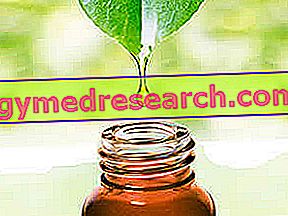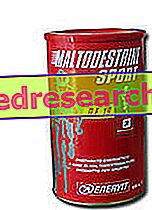The term asthenia indicates a generalized psycho-physical weakness, which is an extremely widespread symptom.

The causes of asthenia are of various kinds; most often they affect the central and / or motor nervous system.
Among the most frequent causes we recognize:
- Sleep alteration.
- Pregnancy or menopause.
- Overtraining.
- Drug addiction or alcoholism.
- Infections and infestations.
- Metabolism disorders.
- Endocrinopathies.
- Malnutrition.
- Alteration of composition and blood flow.
- Neuromuscular or osteoarticular disorders.
- Intoxication.
- Tumors.
- Emotional or psychiatric problems.
What to do
First of all, to combat fatigue:
- Contact your doctor who, with a general visit, will carry out the following checks:
- Measure blood pressure: when it is low it can cause asthenia. In this case the cause will have to be deepened:
- Idiopathic: based on an individual predisposition.
- For dehydration.
- For excessive exposure to heat.
- Due to saline deficiency.
- Glycemic test: the lack of glucose in the blood almost always causes asthenia. The level can now be measured instantly with an electronic device without applying any holes.
- Estimation of sleep and general stress: an inappropriate lifestyle, especially in association with changes in sleep, "discharge" the brain and cause asthenia.
- Search for Sleep Disorders: the presence of a partner or parent is required to observe the subject's nocturnal behavior.
- Blood and urine tests: they measure many parameters and can highlight:
- Hypoglycemia.
- Anemia: hemoglobin deficiency frequently associated with the reduction of red blood cells.
- Metabolic acidosis: may be the cause of unbalanced diets or decompensated metabolic disorders.
- Inflammation factors: for example the C-reactive protein.
- Cancer markers.
- Hormonal alterations.
- Evaluation of a possible pregnancy or climacteric syndrome (menopause).
- Investigation on alcohol abuse, other psychotropic substances or poisoning from contaminants: the after-effects of massive intake and abstinence from certain substances can cause asthenia. The same happens with exposure to poisonous environmental contaminants, such as significant doses of carbon monoxide.
- Evaluation of the training program: when the athlete undergoes very demanding adaptation protocols, it becomes necessary to understand if:
- Recovery between sessions is sufficient.
- The diet is suitable.
- Observation of clinical symptoms and signs due to an infectious disease or infestation.
- Nutritional survey on eating habits to investigate possible deficiencies of:
- Power.
- Mineral salts.
- Vitamins.
- Evaluation of motor function: asthenia can hide articular or even muscular discomforts.
- Identification of any mood disorders or psychiatric symptoms: for example, in depression, asthenia is widespread.
What NOT to do
- Ignoring the symptom: neglecting asthenia could aggravate the triggering cause.
- Underestimate dehydration and saline deficiency.
- Expose yourself constantly to excessive temperatures.
- To sleep little, badly, to neglect the rests of work shifts, to eat before going to bed etc.
- Avoid in-depth diagnosis, especially blood tests.
- Do not carry out the pregnancy test, especially in the presence of other significant indications.
- Do not consider entry into menopause.
- Overdo it with alcohol.
- Make use of drugs.
- Work or frequent polluted environments of dubious safety, exposing themselves to poisonous contaminants such as exhaust gases, chemical solvents, etc.
- Inadequately recover from training and ignore the first symptoms of overtraining.
- Practice extreme diets, unbalanced or otherwise inadequate.
- Underestimate chronic muscular or rheumatic discomforts; may be related to chronic or degenerative inflammatory diseases.
- Hide or be ashamed of relevant psychiatric symptoms; by not treating them, these can significantly worsen and aggravate asthenia up to the onset of more severe states.
What to eat
Dietary intervention can contribute or totally resolve most cases of asthenia.
In fact, in addition to compensating asthenia of "nutritional" origin, the diet:
- Promotes remission from certain diseases (infections, hyperglycemia, etc.).
- Maximize recovery between sports workouts.
- Optimize sleep.
- Hypotension decreases.
- Reduces systemic inflammation etc.
In the first instance, it is necessary to guarantee the dietary intake of:
- Water: if the intake is not adequate and / or the losses are excessive, this is drastically reduced, affecting the blood volume and causing the pressure to drop. It is necessary to drink plenty of water and eat well-hydrated foods.
- Mineral salts: they also intervene on the balance of body fluids. Furthermore, their deficiency is directly implicated in the onset of asthenia. Potassium and magnesium, which are mainly found in vegetables and fruits, are the most common object of deficiency.
- Carbohydrates: Many contemporary weight loss diets provide for drastic reduction or even elimination of carbohydrates. However, these are necessary for maintaining blood sugar levels, especially in conditions of intense physical work. They are contained in: cereals and derivatives, legumes, potatoes, fresh fruit, vegetables.
- Omega 3 fatty acids: have the function of regulating many metabolic aspects. Furthermore, they drastically reduce the phlogistic index of blood. They also appear to have a protective aspect to the nervous tissue. They support the immune system against infections. They are found in: oily blue fish, algae, krill, some oil seeds (flax, almonds, etc.) and related oils.
- Antioxidants: they are vitamin type (vitamin A, vitamin C and vitamin E), mineral (zinc and selenium) and polyphenolic (simple phenols, flavonoids, tannins). They reduce oxidative stress, optimize metabolism and increase the efficiency of immune defenses; they are a real natural defense.
- Vitamin A is contained above all in red and orange fruits (peppers, apricots, melon, etc.), in crustaceans, in milk, in cheeses, in yolk and in liver.
- Vitamin C is contained above all in the sour fruit (kiwi, citrus fruits etc.) and in some vegetables (parsley, lettuce etc).
- Vitamin E is contained mainly in fatty fruits (for example avocado), seed germ (wheat germ, maize germ, etc.) and oilseeds in general.
- Zinc and selenium are mainly found in meat and oil seeds.
- Polyphenols: they are typical of all foods of vegetable origin, in particular whole and fresh (vegetables, fruits, whole seeds, etc.).
- Iron, vitamin B12 and folic acid: deficiency can trigger anemia. Iron (especially haem) and vitamin B12 are contained in meat, fishery products, offal and egg yolk. Folic acid is typical of vegetables and fresh raw fruits (apples, lettuce, oranges, etc.).
- High biological value proteins: in the case of very intense sports, all the essential amino acids must be present in sufficient quantities to promote muscle recovery. The most recommended foods are: meat, fishery products, milk and dairy products, eggs.
- It is essential that the distribution of meals is such as to allow rest without interference. Dinner should not be too close to sleep at night and the products that make it up should be quite digestible.
- Group B vitamins: they affect most food groups. They can be deficient when the diet is inadequate overall.
- Methylxanthines: they are light nervous stimulants. They are found in coffee, cocoa, tea, ginseng etc. They have a tonic effect and can reduce the sensation of asthenia.
What NOT to Eat
There are no foods that create asthenia. On the other hand it must be remembered that:
- Hyperglycemia causes weakness. An excess of glucose in the blood is associated with a reduction in body efficiency. It occurs mainly in people with diabetes and must be treated with a diet having the right amount - quality of carbohydrates.
- It is not recommended to replace fresh, unprocessed and nutritionally valuable foods with: preserved and processed products, junk foods and fast food.
- Alcohol abuse must be avoided.
Natural Cures and Remedies
The natural remedies for fatigue are limited to the intake of stimulating herbal products, the integration of deficient nutritional molecules and psychological therapy.
- The integration of deficient molecules is more frequent:
- Potassium and magnesium.
- Omega 3 fatty acids.
- Antioxidants.
- The plants mostly used in herbal medicine to combat fatigue are: camedio, gentian, periwinkle, rosemary, ginger, ginseng, black currant, oak, lavender, oregano, passionflower, rhubarb, sage, dandelion, thyme, birch, oat, eleuterococcus and nettle.
- Psychological therapy is aimed at reducing the symptoms of anxiety, depression, obsessive syndromes, phobias, etc. By improving the triggering cause, it reduces asthenia and promotes the recovery of normal activities.
Pharmacological care
Pharmacological treatments for fatigue can be differentiated into two categories:
- Drugs against the disease that causes fatigue:
- Drugs for the treatment of metabolic diseases: for example hypoglycemic agents for diabetes.
- Hormonal therapies: for example the "replacement" for climacteric syndrome.
- Against infestations and infections: for example antivirals, antibiotics etc.
- Containing the concentrated nutrient of which the deficiency is manifested: for example folic acid, iron, cobalamin etc.
- Anti-inflammatories for chronic diseases: by reducing inflammation and pain it is possible to increase the subject's activity.
- Drugs against psychiatric conditions characterized by asthenia:
- Sleeping pills and sedatives to promote sleep.
- Anxiolytics.
- Antidepressants.
- Antipsychotics.
Prevention
Prevention of fatigue is not always possible.
On the other hand, having already suffered, it is possible to correct one's habits and food style. For example:
- Preventing dehydration and low blood pressure: it is possible by increasing the amount of water, hydrated foods and taking hydrosaline supplements.
- Preventing hypoglycemia: some people suffer from hypoglycemia if they allow too much time to pass between meals. It is possible to prevent it by eating more often and in sufficient quantities.
- Preventing anemia: it requires many dietary precautions that must be constantly observed (see anemia diet).
- By preventing repeated hangovers.
- Preventing general malnutrition: following a balanced diet. If you need to lose weight, it is recommended to do so by leaning on a dietician.
- Preventing overtraining: improving planning and adapting the project during construction.
Medical Treatments
Possible medical treatments for asthenia are highly specific towards the triggering cause.



